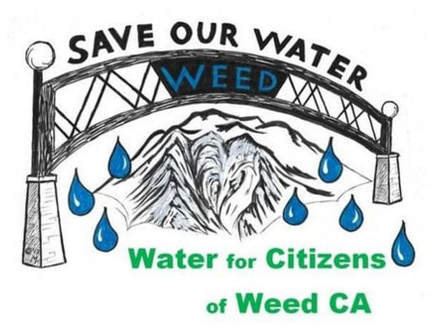
Bruce detailed the 100-year history of weed's water issues. A former company town, where land, homes, infrastructure, and the local store were all owned by a lumber company, Weed was incorporated only in the 1950s. After incorporation, a public water utility was set up, using gravity-fed spring water.
When International Paper sold its interests in town to Roseburg Lumber, paperwork indicating ownership of water rights were lost, said Bruce. Roseburg Lumber, now Roseburg Forest Products, claims that it still has legal right over local water, including what is delivered through the town's water system. The company has sold water to Crystal Geyser, a bottle water brand owned by a Japanese pharmaceutical company, and plans to sell more, while currently charging Weed $100,000 a year for the water the town used to be able to access for free.
The company has also sued in an attempt to shut down citizen activism that was leading to negative publicity. "I think they thought we were small town people that they could intimidate," said Bruce, who was named in the suit. The case was dismissed in Superior Court in December. A court case over the ownership of the water itself continues.
Mt. Shasta's volcanic aquifers are an important source of spring water, and have been under attack nearly constantly since Nestle's failed attempt to build the world's largest bottling plant in nearby McCloud, according to Angelina. Current regulation of bottling is insufficient--towns can't even find out how much water is being pumped for bottling and sale.
She pointed our vulnerability to corporate interests, even in towns with good water supplies. From consumer susceptibility to the bottled water marketing hype, to deep problems with failing public water infrastructure and water security, private interests see opportunities to profit from concerns--legitimate or otherwise--about what comes out of the tap.
But she noted that this is a unifying campaign for the town, which has taken on the responsibility to "get informed, get involved, contribute to the groups that are representing the public interest and the human right to water, and participate."

 RSS Feed
RSS Feed
